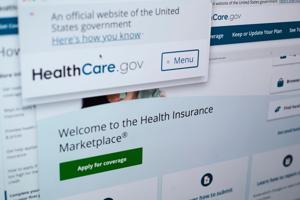The ongoing government shutdown has intensified discussions surrounding the substantial $136 billion that the federal government is projected to spend in 2025 on subsidies for rising health insurance premiums under the Affordable Care Act, commonly known as Obamacare. Reports from the Wall Street Journal indicate that, regardless of the resolution of this fiscal situation, Americans can expect health insurance premiums to rise by an additional 8% to 9% in the coming year. This trend raises concerns about financial sustainability, particularly as profits for major health insurers continue to soar while many families struggle to meet their healthcare costs.
The current health insurance landscape reveals a significant dysfunction within the market. A staggering number of Americans, approximately 11.7 million, had no medical claims in 2024, despite paying high monthly premiums. This situation raises questions about the effectiveness and value of the existing insurance system. Insurance is fundamentally designed to shield families from catastrophic financial burdens, yet many are paying for coverage they seldom utilize. This misalignment highlights the need for a more sensible and economically viable healthcare system.
One proposed solution is the promotion of catastrophic health insurance plans, which have been available for decades. These plans typically feature lower premiums while providing coverage for major medical expenses and require policyholders to pay for minor health costs directly. According to data from the Paragon Health Institute, the average premium for a 50-year-old enrolled in a catastrophic health plan is approximately $443 per month, equating to about $5,316 annually. In contrast, the average premium for standard Obamacare plans approaches nearly $10,000 per year. This difference presents a potential saving of around $4,600 annually for individuals, which could be redirected towards medical expenses or other investments.
Despite their benefits, catastrophic health plans face criticism from some lawmakers and health insurers, who label them as “junk health insurance.” However, a report from Forbes indicates that these plans cover the same essential health benefits mandated by Obamacare, such as emergency services, hospitalization, and prescription drugs. The primary barrier to broader adoption of these plans lies in a provision of the Affordable Care Act that restricts enrollment to individuals under 30 or those qualifying for a “hardship” exemption.
Critics argue that this provision effectively limits consumer choice and forces individuals into plans that may not be financially feasible for them. Proponents of catastrophic coverage advocate for the repeal of this restriction, asserting that allowing greater access to these plans could reduce government spending and stimulate economic growth. In addition, recent changes to tax laws, particularly the legislation signed by President Donald Trump on July 4, 2025, enhance the appeal of catastrophic plans by permitting members to contribute to health savings accounts (HSAs). These tax-advantaged accounts allow families to cover routine medical expenses and carry over unspent funds for future use.
As discussions around healthcare reform continue, advocates for catastrophic health insurance emphasize the need to eliminate wasteful subsidies and the prevailing “one-size-fits-all” approach to health coverage. They argue that a more flexible system allowing for catastrophic plans would better serve the interests of families and taxpayers alike. By transitioning to a model that prioritizes major medical coverage while allowing individuals to manage smaller costs directly, the healthcare system could become more efficient, reducing the financial burden on both consumers and the government.
In conclusion, the current healthcare debate underscores the necessity for a reevaluation of insurance options available to Americans. Expanding access to catastrophic health insurance plans could provide a viable solution for those seeking affordable coverage while still ensuring protection against significant health expenses. The conversation surrounding this issue is critical, as it not only impacts individual families but also has broader implications for the nation’s healthcare economy.







